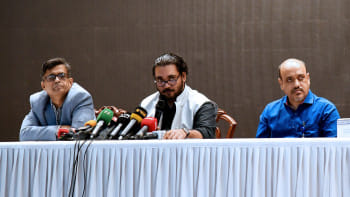Strumming nostalgia!

Publisher: Pearl Publications, Pages: 86, Price: Tk 135
SOMEONE once said: people who listen to music fervently, retain a sense of innocence in them till death. The proof is right here in front of us in an extraordinarily refreshing narrative of the evolution of rock music in Bangladesh, as seen by an avid music lover. The book is about the development of band music phenomenon in the country with countless references to English rock and pop icons.
In fact, it would not be wrong to state that in trying to give us a cohesive picture of how Western instrument based music industry grew in Bangladesh, the book presents a delicious slice of an enchanting past when a large number of urban youth was immersed in exploring a vast world of rock, psychedelic, heavy metal vis a vis the innovative experiments in our own music industry.
On one hand it's a historical work but then, if it had been just a work detailing the hardcore facts then Rock Jatra would have been just another read. Thankfully, this is not just another book because the writer, a music connoisseur, gives a minutiae account of his growing up in Dhaka in the presence of some legendary music names like Niloy, Azam Khan etc. Therefore, this is also semi-autobiographical – marvellously profound, since references to TDK cassettes, open air concerts, LP covers, Rainbow Recording Center, Coffee House in Elephant Road and Blue Nile Hotel evoke memories of a lost era.
When I mean lost, I truly mean gone forever, since in our current social credo, the culture of band music, both local and foreign, do not have such a prominent place anymore. Times have changed, five minutes in the Internet can get you anything you want to listen to but this convenience has made us blasé.
For Milu and his likes, in the 80s, getting hands on a rare album meant plenty of effort topped with some mouthwatering adventure. That is exactly why, we see the writer hanging out at a seedy local hooch selling outlet in the company of a Bohemian just to have an album recorded. By the way, the album in question is Secret Policeman's other Ball – a variety show which John Cleese used to moderate between late 70s and early 80s to raise money for Amnesty International. If you want to see a young Phil Collins and a fluffy Rowan Atkinson, then look up the video in You Tube.
Milu brings out the faded history of the fledgling days of band music here when he goes back to the period prior to independence and, to the famous Chameli Room at the Hotel Intercontinental. A fascinating picture emerges with St Gregorians and one Fazle Rob appearing as major catalysts.
The book moves on with the sub theme of a young boy pestering his mother to buy a guitar and then embarking on his journey into music, armed with his instrument. Milu had the opportunity to be trained by the late guitar prodigy Niloy, who died prematurely, but left enough materials for a cult to develop and proliferate. The subtle political allusions cannot be missed and, perhaps, more should be written on this issue – the role of band musicians in Bangladesh in providing a cultural outlet to the protest of the masses during the 82-90 autocratic regime. The band music jamboree at the DU campus which blended with the aspirations of millions of young people after the fall of Ershad is mentioned, whisking many of us back to those days of Utopian ideals, topped with relentless romance. Milu writes passionately about the force of music which triggered a social revolution paving way for names like Renaissance, Miles, Feedback, LRB, Souls, Feelings, Winning, Different Touch and Nova.
The Bengali rock/pop music scenario is also vibrant today, but somehow, the verve of that lost era is absent. Will I be wrong to state that thirty years ago, there was an evangelical zest that drove musicians and music listeners? Alas, that ardour is missing today, we have become way too calculating! There is plenty of music now, though the passion is more controlled. Milu talks of an age when heart ruled music!
Rock Jatra is a treasure trove of information not publicized before – how many of you know that when bands from Chittagong came to Dhaka to perform they usually stayed at the Blue Nile Hotel near Science Laboratory? Or that Imtiaz Alam Beg, a noted photographer and the suitable son of late photographer par excellence, Manzoor Alam Beg, spent a large chunk of his time in the early 90s snapping photos of bands in concert? Just imagine, today, almost 27 years later, these images are invaluable records of the evolution of band music in Bangladesh. Inclusions of some of these photos would have made the book even more comprehensive. This is indeed a sensational piece of work: history and the tale of a young boy growing up with a transforming social atmosphere, holding doggedly to unsullied ideals.
And the best thing, his dad did not smash his instrument in the end! All throughout this book, there is a contagious sense of youthful purity and this is exactly why you would want to read it, and then, reread it, because Milu gives us the chance to catch that lost rainbow one more time!
The reviewer is an occasional contributor to this page.


 For all latest news, follow The Daily Star's Google News channel.
For all latest news, follow The Daily Star's Google News channel. 



Comments